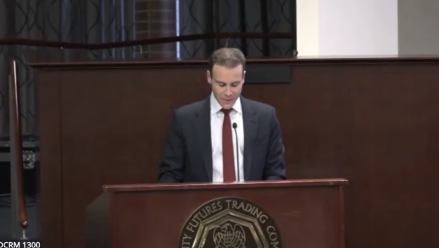Kalshi is walking a regulatory tightrope as it expands globally.
The prediction market has no plans to advertise its services outside the U.S., in what seems to be a move to limit regulatory scrutiny. But the Netherlands’ gambling authority is considering legal action against the platform, and it may not be the only non-U.S. regulator to do so.
On Oct. 10, Kalshi said it was expanding to more than 140 countries, together home to billions of people, all in a single global liquidity pool.
A little over two weeks on, not much else has happened with regard to Kalshi’s global plans.
After the initial announcement, Kalshi has not taken further steps to promote its international product. Its app is still not available on non-U.S. app stores, Sportico noted Wednesday, and there appear to be no other major efforts to let the rest of the world know that the exchange is available to them.
The expansion certainly doesn’t seem to have led to a surge in activity at Kalshi. Trading data shows that, since opening to international customers, Kalshi is still yet to top its record for volume in a day, set on Oct. 5.
A spokesperson told InGame that there are no plans to market the exchange outside the U.S.
“On the international front, Kalshi does not currently have any active international advertising campaigns in place,” the spokesperson said. “Any visibility outside the U.S. would be organic rather than part of a targeted effort.”
The Kalshi spokesperson did not mention whether the decision was due to regulatory factors. But the decision appears to be a way to avoid running afoul of local gambling rules.
Active or passive presence?
In much of Europe, where almost every country has legalized online gambling and has its own regulations, the difference between “organic” and “targeted” visibility can be very important.
In countries including France, Spain, and the Nordic nations, regulators draw a distinction between a site that happens to be available to customers from their jurisdiction and a site that specifically courts them.
That equilibrium has allowed regulators to crack down on blatant black market sites, but avoid accusations of violating European Union rules about the free movement of services.
Advertisements delivered to one country are usually a clear sign that a site is “targeting” that country. Offering the site in the local language, an app on the domestic app store, or payments via the local currency are other red flags. Less concrete, but sometimes considered by regulators, is whether advertisements feature celebrities or influencers whose appeal is concentrated entirely in one country, or payment methods that are overwhelmingly popular only in their country.
“Online gambling that is not directed towards the Swedish market is not considered to be provided in Sweden,” a spokesperson for Swedish regulator Spelinspektionen told InGame. “The assessment of whether a gambling service targets Sweden is made on an overall basis, taking into account factors such as language, currency, payment methods, customer support, and marketing.”
A spokesperson for Denmark’s Spillemyndigheden expressed a similar sentiment. They said they would only consider bets to be offered in Denmark if a site uses the Danish language, the Danish Krone, payment cards that only work in Denmark, Danish customer service offers, or bets on events that are only likely to be of interest to Danes, such as matches in the country’s lower soccer divisions.
In any jurisdiction where that’s the standard, Kalshi appears to be doing just enough to avoid regulatory scrutiny. Aiming for “organic” growth abroad is unlikely to lead to punishment.
“At present, the authority has not carried out any supervisory measures regarding Kalshi and does not make assessments of individual concepts without sufficient grounds for such examination,” the Spelinspektionen spokesperson said.
Dutch regulator may take action
But that balance isn’t a universal rule, even within the European Union.
The Netherlands — a latecomer to regulating online gambling — has taken one of the strictest approaches in the European Union when it comes to sites that may not target local customers but certainly don’t turn them away. In 2021, as it opened its regulated market, it told unlicensed operators that unless they actually block Dutch customers, they should expect to face fines or potentially criminal charges.
So could that apply to Kalshi, and to Polymarket, which has been available in the Netherlands for years?
The country’s regulator certainly thinks so. It’s thinking about taking legal action against both major prediction market platforms, a spokesperson told InGame.
“The Netherlands Gambling Authority (KSA) is aware of the launch of Kalshi on the Dutch market,” the spokesperson said. “Prediction markets such as Polymarket and Kalshi claim that they do not fall under gambling legislation, as they consider themselves to be a ‘financial exchange.’
“The KSA disputes this position and is of the opinion that these websites do offer the possibility of gambling, and is currently considering further legal action.”
Germany is the other European country that has been most willing to take action against companies that may not be “targeting” its residents. Its regulator, the Gemeinsamen Glücksspielbehörde der Länder (GGL), noted that it was aware of Kalshi, and said any operator offering bets without being on its list of licensees was considered illegal gambling.
“The company Kalshi Inc. is known to the GGL. It does not have a license to organize or broker gambling within the meaning of the 2021 State Treaty on Gambling,” a GGL spokesperson told InGame. “Due to ongoing administrative activity, no information can be provided on individual procedures or specific measures.”
Excluded countries
Kalshi’s global expansion doesn’t apply to all countries. Just before it set up its international plans, the prediction market published a list of territories from which trading is prohibited. Some of those are nations under U.S. sanctions, like Iran and North Korea. But others, like France and the U.K., are prohibited for other reasons.
That list has gradually expanded. The initial version included 44 countries, but Australia, Belgium, and most recently Italy have been added.
In these countries, the prohibition is not total. Kalshi allows users who have already set up an account in a country where the platform is permitted — with information confirming their residence in that country — to continue trading anywhere in the world. InGame was able to place a bet from the U.K. this month, using an account created in the U.S.
But a spokesperson for the Great Britain Gambling Commission said it didn’t see any distinction between British residents creating accounts to bet and U.S. residents betting in the U.K. with accounts created in the U.S.
“The Commission operates a point-of-consumption framework, which means that any operator providing facilities for gambling to consumers in Great Britain must hold a licence from the Gambling Commission, irrespective of where the operator itself is based.
“This applies regardless of the consumer’s nationality, the operator’s licensing position in another jurisdiction, or the fact that the consumer may have opened their account elsewhere. As such, it may be the fact that Kalshi’s U.S. regulator themselves would allow for Kalshi to provide services to their customers whilst they are temporarily abroad, but that does not affect U.K. law and the Commission’s regulatory power.”
A spokesperson for Kalshi did not respond to a question on the criteria to exclude some countries from the international site.
Most regulators call PMs gambling
The question of whether Kalshi’s status as a registered financial exchange makes it exempt from gambling laws is mostly something European gambling regulators have not been convinced by. But there is at least one exception to that rule too.
Kalshi’s growth in the U.S. has been enabled by the argument that it offers financial “swaps” regulated by the Commodity Futures Trading Commission, and therefore state gambling laws are overruled. But at this point it’s not registered with any non-U.S. regulators, whether financial or gambling.
And without a domestic financial regulator to point to, it doesn’t appear that local gambling regulators see Kalshi as anything other than another gambling site.
One factor in that view is that in many European countries, sportsbooks have long offered bets on activities other than sports, so Kalshi’s offering appears to fit very naturally under the purview of gambling regulators.
Exchange-style betting, too, has existed in Europe for decades.
“Non-financial events, such as sports, politics, or weather, may under Swedish law be considered betting activities and therefore subject to licensing requirements if the gambling is directed towards the Swedish market,” a spokesperson for Swedish regulator Spelinspektionen told InGame.
The spokesperson for Germany’s GGL told InGame that Germany’s sports betting ordinance specifically outlaws non-sports bets.
But Latvia’s IUAI does believe that prediction markets are distinct from gambling sites.
“While traditional betting involves fixed stakes on an outcome, ‘prediction markets’ often operate closer to a financial exchange where users trade ‘shares’ or ‘contracts’ related to an outcome,” an IUAI spokesperson told InGame. “These contracts’ prices fluctuate based on supply, demand, and market sentiment — a mechanism that differs from a simple bet with fixed odds.”
The spokesperson added that individual sites could still be evaluated to see if they meet the legal definition of gambling.






